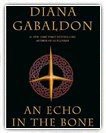Outlander aka Cross Stitch - Gabaldon Diana (читать книгу онлайн бесплатно полностью без регистрации .TXT) 📗
He dropped into one of his scholarly trances, muttering to himself from time to time. The trance was broken only when he stumbled unexpectedly over an obstacle near the bottom of the hill. He flung his arms out with a startled cry as his feet went out from under him and he rolled untidily down the last few feet of the path, fetching up in a clump of cow parsley.
I dashed down the hill after him, but found him already sitting up among the quivering stems by the time I reached the bottom.
“Are you all right?” I asked, though I could see that he was.
“I think so.” He passed a hand dazedly over his brow, smoothing back the dark hair. “What did I trip over?”
“This.” I held up a sardine tin, discarded by some earlier visitor. “One of the menaces of civilization.”
“Ah.” He took it from me, peered inside, then tossed it over one shoulder. “Pity it’s empty. I’m feeling rather hungry after that excursion. Shall we see what Mrs. Baird can provide in the way of a late breakfast?”
“We might,” I said, smoothing the last strands of hair for him. “And then again, we might make it an early lunch instead.” My eyes met his.
“Ah,” he said again, with a completely different tone. He ran a hand slowly up my arm and up the side of my neck, his thumb gently tickling the lobe of my ear. “So we might.”
“If you aren’t too hungry,” I said. The other hand found its way behind my back. Palm spread, it pressed me gently toward him, fingers stroking lower and lower. His mouth opened slightly and he breathed, ever so lightly, down the neck of my dress, his warm breath tickling the tops of my breasts.
He laid me carefully back in the grass, the feathery blossoms of the cow parsley seeming to float in the air around his head. He bent forward and kissed me, softly, and kept on kissing me as he unbuttoned my dress, one button at a time, teasing, pausing to reach a hand inside and play with the swelling tips of my breasts. At last he had the dress laid open from neck to waist.
“Ah,” he said again, in yet another tone. “Like white velvet.” He spoke hoarsely, and his hair had fallen forward again, but he made no attempt to brush it back.
He sprang the clasp of my brassiere with one accomplished flick of the thumb, and bent to pay a skilled homage to my breasts. Then he drew back, and cupping my breasts with both hands, drew his palms slowly down to meet between the rising mounds, and without stopping, drew them softly outward again, tracing the line of my rib cage clear to the back. Up and again, down and around, until I moaned and turned toward him. He sank his lips onto mine, and pressed me toward him until our hips fitted tightly together. He bent his head to mine, nibbling softly around the rim of my ear.
The hand stroking my back slipped lower and lower, stopping suddenly in surprise. It felt again, then Frank raised his head and looked down at me, grinning.
“What’s all this, then?” he asked, in imitation of a village bobby. “Or rather, what’s not all this?”
“Just being prepared,” I said primly. “Nurses are taught to anticipate contingencies.”
“Really, Claire,” he murmured, sliding his hand under my skirt and up my thigh to the soft, unprotected warmth between my legs, “you are the most terrifyingly practical person I have ever known.”
Frank came up behind me as I sat in the parlor chair that evening, a large book spread out on my lap.
“What are you doing?” he asked. His hands rested gently on my shoulders.
“Looking for that plant,” I answered, sticking a finger between the pages to mind my place. “The one I saw in the stone circle. See…” I flipped the book open. “It could be in the Campanulaceae, or the Gentianaceae, the Polemoniaceae, the Boraginaceae – that’s most likely, I think, forget-me-nots – but it could even be a variant of this one, the Anemone patens.” I pointed out a full color illustration of a pasqueflower. “I don’t think it was a gentian of any kind; the petals weren’t really rounded, but-”
“Well, why not go back and get it?” he suggested. “Mr. Crook would lend you his old banger, perhaps, or – no, I’ve a better idea. Borrow Mrs. Baird’s car, it’s safer. It’s a short walk from the road to the foot of the hill.”
“And then about a thousand yards, straight up,” I said. “Why are you so interested in that plant?” I swiveled around to look up at him. The parlor lamp outlined his head with a thin gold line, like a medieval engraving of a saint.
“It’s not the plant I care about. But if you’re going up there anyway, I wish you’d have a quick look around the outside of the stone circle.”
“All right,” I said obligingly. “What for?”
“Traces of fire,” he said. “In all the things I’ve been able to read about Beltane, fire is always mentioned in the rituals, yet the women we saw this morning weren’t using any. I wondered if perhaps they’d set the Beltane fire the night before, then come back in the morning for the dance. Though historically it’s the cow herds who were supposed to set the fire. There wasn’t any trace of fire inside the circle,” he added. “But we left before I thought of checking the outside.”
“All right,” I said again, and yawned. Two early risings in two days were taking their toll. I shut the book and stood up. “Provided I don’t have to get up before nine.”
It was in fact nearly eleven before I reached the stone circle. It was drizzling, and I was soaked through, not having thought to bring a mac. I made a cursory examination of the outside of the circle, but if there had ever been a fire there, someone had taken pains to remove its traces.
The plant was easier to find. It was where I remembered it, near the foot of the tallest stone. I took several clippings of the vine and stowed them temporarily in my handkerchief, meaning to deal with them properly when I got back to Mrs. Baird’s tiny car, where I had left the heavy plant presses.
The tallest stone of the circle was cleft, with a vertical split dividing the two massive pieces. Oddly, the pieces had been drawn apart by some means. Though you could see that the facing surfaces matched, they were separated by a gap of two or three feet.
There was a deep humming noise coming from somewhere near at hand. I thought there might be a beehive lodged in some crevice of the rock, and placed a hand on the stone in order to lean into the cleft.
The stone screamed.
I backed away as fast as I could, moving so quickly that I tripped on the short turf and sat down hard. I stared at the stone, sweating.
I had never heard such a sound from anything living. There is no way to describe it, except to say that it was the sort of scream you might expect from a stone. It was horrible.
The other stones began to shout. There was a noise of battle, and the cries of dying men and shattered horses.
I shook my head violently to clear it, but the noise went on. I stumbled to my feet and staggered toward the edge of the circle. The sounds were all around me, making my teeth ache and my head spin. My vision began to blur.
I do not know now whether I went toward the cleft in the main stone, or whether it was accidental, a blind drifting through the fog of noise.
Once, traveling at night, I fell asleep in the passenger seat of a moving car, lulled by the noise and motion into an illusion of serene weightlessness. The driver of the car took a bridge too fast and lost control, and I woke from my floating dream straight into the glare of headlights and the sickening sensation of falling at high speed. That abrupt transition is as close as I can come to describing the feeling I experienced, but it falls woefully short.
I could say that my field of vision contracted to a single dark spot, then disappeared altogether, leaving not darkness, but a bright void. I could say that I felt as though I were spinning, or as though I were being pulled inside out. All these things are true, yet none of them conveys the sense I had of complete disruption, of being slammed very hard against something that wasn’t there.



